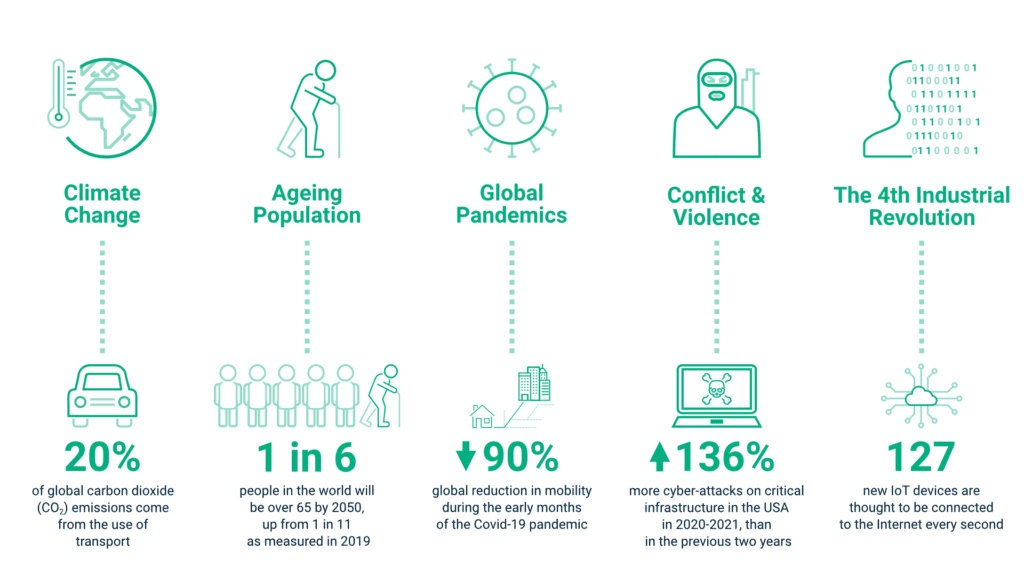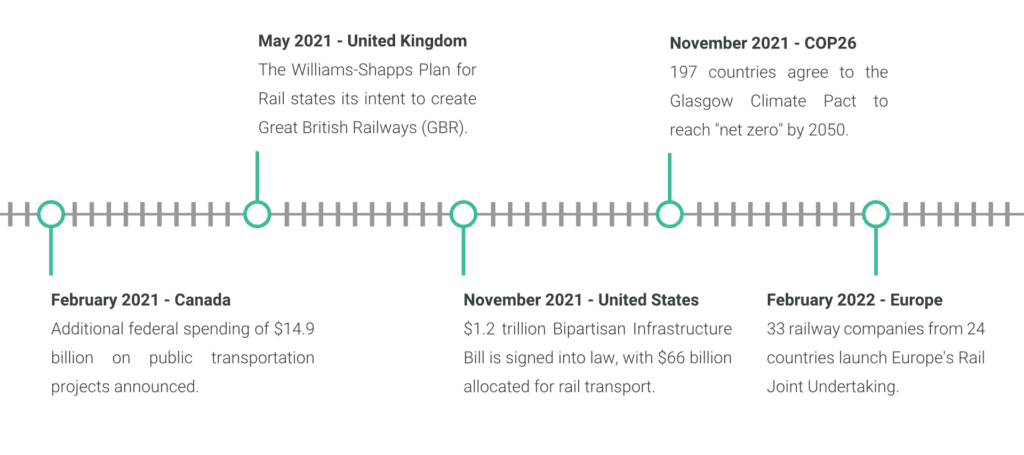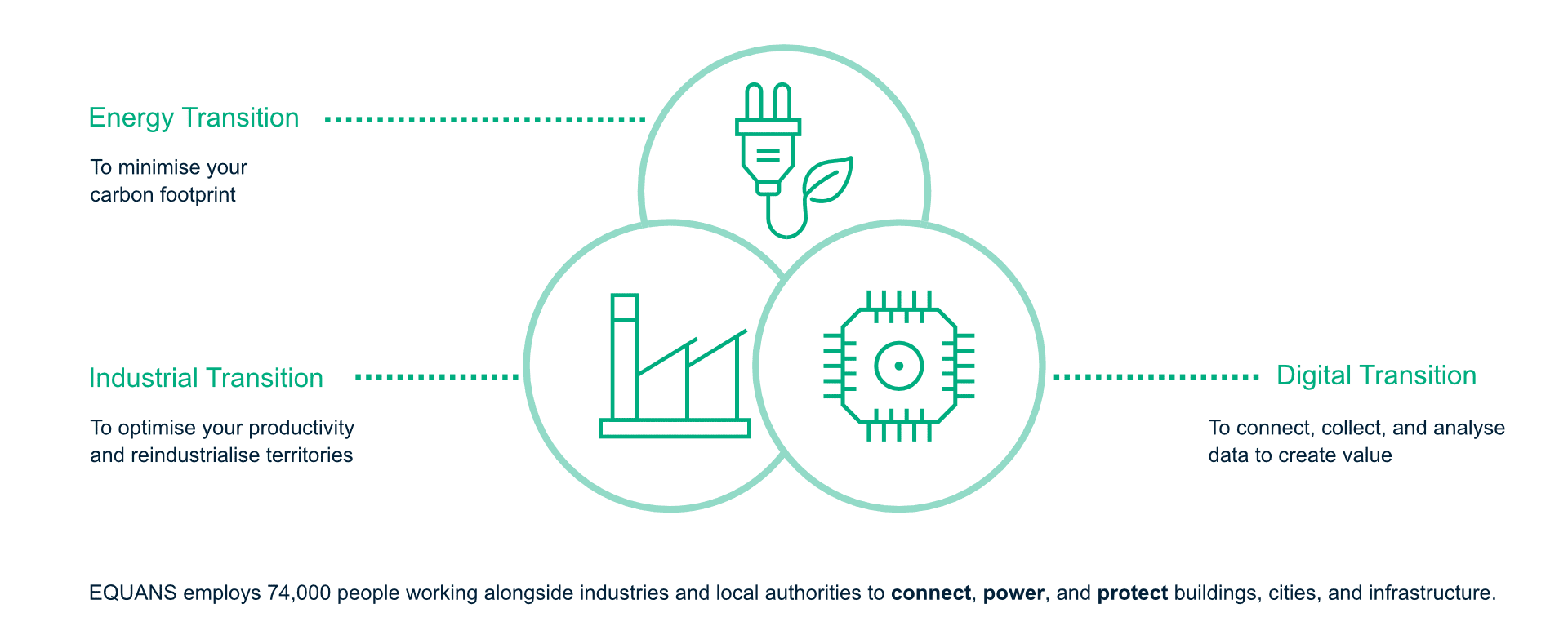It is one thing to observe that the world is changing. It is something else to feel the impact, respond, and actively influence the direction of that change for the better.
This is the opportunity open to Icomera and the wider transport industry today.
We are at a turning point in how we travel. As with every journey, to know where we are going, we first have to understand how we got here…
Global Trends and Challenges Shaping the Goals of Passenger Transport over the Next Decade
In 2015, the United Nations produced a list of the global trends and challenges that it deemed to be the most pressing[1]. In 2016, the World Economic Forum followed suit, issuing a list of the 10 most important issues from an economy-centred viewpoint[2]. Reports by governments and other organisations have also served to highlight emerging threats to our way of life.
Unsurprisingly, there are trends and challenges that appear across multiple lists and reports. More interestingly, many appear to be more relevant today than at any point in living memory.
I would like to highlight just five, in no particular order:
- Climate Change – Global warming driven by human-induced emissions of greenhouse gases and the resulting large-scale shifts in weather patterns. Nineteen of the hottest years on record have occurred since the new millennium[3] and transport accounts for around one-fifth of global carbon dioxide (CO2) emissions[4].
- Ageing Populations – An increasing median age of the population because of declining fertility rates and rising life expectancy. In 2018, for the first time in history, people over the age of 65 outnumbered children under the age of five. By 2050, one in six people in the world will be over 65, up from one in 11 in 2019[5]. This increases the percentage of the population who will struggle to do certain activities, like travelling independently, if the issue of universal design is not addressed.*
- Global Pandemics – The rapid spread of a disease over a large number of people in different countries / on different continents and the subsequent waves and associated disruption. During the early months of the Covid-19 pandemic, travel in major cities fell by over 90%, with economic hubs like New York and London seeing mobility at 4% and 7% of pre-pandemic levels, respectively, in April 2020[6].
- Conflict and Violence – Ranging from entrenched conflict, to organised crime, urban violence, and violent extremism[7]. Increasingly, these are spilling over into online attacks. For example, in 2020-2021 there were 136% more cyber-attacks on critical infrastructure in the USA than in the previous two years8.
- The Fourth Industrial Revolution – The blurring of boundaries between the physical and digital worlds, encompassing advances in artificial intelligence (AI), robotics, the Internet of Things (IoT), and other technologies for increased automation and improved data exchange. It is estimated that 127 new IoT devices are connected to the web every second in the pursuit of the benefits on offer[9].
These issues will continue to dominate the global agenda over the next decade, due to the cyclical causality of their relationships with one another.

Current events are focussing the minds of political and business leaders to address these global trends and challenges by working together to achieve global goals. Headline activities include:
- Reducing human-induced emissions of greenhouse gases to fight climate change
- Catering for an ageing population and those with accessibility needs
- Reducing the spread of disease to mitigate against the effects of global pandemics
- Protecting citizens from physical and cyber threats arising from conflicts and violence
- Accelerating the Fourth Industrial Revolution in a smart, clean, and safe way, so that it can play a more central role in addressing all of the above
The transport industry has an important role to play here.
As I said earlier, we are at a turning point in how we travel, in terms of frequency, distance, mode, our whole approach. But importantly, we will continue to travel – for work, leisure, or access to services.
Sustainability will be key to travelling in a way that supports humanity’s pursuit of global goals –environmentally, economically, and socially. Passenger transport is the most sustainable form of transport – moving more people with fewer vehicles and reducing greenhouse gas emissions. But the industry has undoubtedly been hit hard by the COVID-19 pandemic. It will have to overcome many challenges on its journey back to pre-COVID usage levels and, beyond that, to meet the increase in demand that comes from shifting society’s travel habits further towards sustainable, green mobility.
So how can the industry attract more passengers in a post-pandemic world?
Simply put, it must support the global goals that have arisen from global trends and challenges:
- Passenger transport must cater for the evolving needs of business and leisure commuters, regardless of age or disability.
- It must offer a safe environment that minimises the spread of disease, and guards against physical and cyber threats to the individual and to wider infrastructure.
- It must do this in a cost-effective and resilient way that also allows it to adapt to rapidly changing environmental, societal, and economic needs in the future.
A Transformative Decade
Around the world, plans, targets, and funding to support the pursuit of these goals are starting to materialise. Collectively, they lay the foundations for a transformative decade for passenger transport. Highlights include:
- Canada – In February 2021, Canadian Prime Minister Justin Trudeau announced plans for the federal government to spend an additional $14.9 billion on public transportation projects across the country over the next eight years, with a permanent transit fund of $3 billion per year starting in 2026[10]. The funding will offer city planners long-term predictability, supporting a largescale upgrade and expansion of services.
- United Kingdom – In May 2021, the UK Department for Transport published the Williams-Shapps Plan for Rail, stating its intent to create a new state-owned public body that will oversee rail transport in Great Britain from 2023. Great British Railways (GBR) will integrate the previously fragmented running of the national rail system, owning the infrastructure, setting most fares and timetables, and planning and running the network[11]. This announcement came only months after the publication of a strategy for better bus services in England through an ambitious reform of the way they are planned and delivered[12].
- United States – In November 2021, US President Joe Biden signed a $1.2 trillion infrastructure bill into law. The package provides $39 billion to modernise and expand public transit to meet rider demand and $66 billion for passenger and freight rail, making it the largest ever federal investment in public transit, and the largest in passenger rail since the creation of Amtrak over 50 years ago13.
- United Nations Climate Change Conference (COP26) – In November 2021, 197 countries agreed to the Glasgow Climate Pact, aimed at staving off dangerous climate change. This reaffirms the Paris Agreement’s goals of keeping the increase in global average temperatures below 2 °C above pre-industrial levels, and pursuing efforts to limit the increase to 1.5 °C. The pact also recognises that these goals require rapid, deep, and sustained reductions in global greenhouse gas emissions, reducing global carbon dioxide emissions by 45% by 2030, and to net zero by 2050[14].
- Europe – In February 2022, 33 railway companies from 24 European countries officially launched Europe’s Rail Joint Undertaking, aiming to significantly increase the modal share of rail transport by 2030. The group committed to reducing rail transport greenhouse gas emissions by 30% by 2030, and to reaching climate neutrality by 2050, in line with the European Union’s overall objectives. Expectations were also expressed for Europe’s largest rail research and innovation programme worth €1.2 billion[15].

The Connected Journey
When Icomera developed and deployed the world’s first onboard Wi-Fi service in 2003, we created a new amenity that brought the passenger experience into the 21st century. This was four years ahead of the first iPhone, and even 4G networks were still another six years away.
We subsequently became the world’s leading provider of wireless connectivity for trains, trams, buses, and coaches, and in the same period, established a track record of consistently identifying and meeting the future requirements of the passenger.
While making no claims to have seen in advance how all recent global events would unfold, the future of our industry will be heavily based on digitalisation, using the same technologies that Icomera has consistently presented over many years, albeit the timelines for mass adoption have now been massively accelerated, and there will be a greater-than-expected emphasis placed on making safety and operational improvements visible to passengers.
One thing that many of the technologies and strategies underpinning the future of travel have in common is the importance of, and reliance on, real-time or on-demand access to information for all parties – Restoring confidence from door to destination, making every ride time-efficient for the passenger, and cost-effective for the operator.
With an increasing number of onboard devices or systems requiring connectivity, the increasing value of the data they generate, and the increasing importance of its timely availability, ensuring the reliable and secure transmission of the data that all these systems generate and utilise, to and from the moving vehicle, is key.
This is precisely the challenge that Icomera has been addressing for the last 20 years, and it is the cornerstone of the role we intend to play in redefining the way we travel over the next 10.
The Building Blocks for Delivering The Connected Journey
1. Connectivity
When Icomera was founded in 1999, we took our name from the phrase ‘Intelligent COMmunication ERA’. Providing the fastest, most reliable connection available for moving vehicles and the passengers on board, along the entirety of their routes through rural and urban landscapes, was at the core of everything we set out to do.
We continue to be the world leader in this area today. In 2020, Icomera successfully designed, manufactured, and trialled the world’s first 5G-enabled router for connected rail vehicle solutions[16], integrating it with the rest of our next-generation hardware and software connectivity platform. We delivered over one gigabit of data per second to a train using only commercially available 4G and 5G cellular networks, surpassing the benchmark referred to in the industry as ‘the Gigabit Train’.
Now, this foreseeable-future-proof technology is being installed on vehicles in countries around the world, ready to simultaneously support the myriad of connected onboard systems and services that will collectively address the overarching goals of the transport industry.
2. Connected Applications
Historically, Passenger Wi-Fi has been the most obvious application for ‘Internet on board’, turning travel time into productive time. But as an increasing number of other passenger services go digital, they too are becoming connected.
Icomera acquired passenger infotainment providers GoMedia in September 2020. We are now utilising this dedicated team to deliver some of the key services required for the contemporary digital passenger experience – business or leisure. These range from personalised journey information for all passengers, including those with accessibility needs[17], before they travel, to onboard entertainment and two-way communication channels[18] with the operator while the journey is in progress – something that is just not possible with traditional information channels.
In addition to solutions that directly deliver passenger satisfaction, we are also witnessing a period of intensive digitalisation when it comes to improving safety and operational efficiency. Given our large installed base, Icomera has been involved in many of these trials, developing and deploying solutions that are natural extensions of our core competencies, or working with other industry leaders. These include real-time monitoring of passenger numbers with AI software-enhanced cameras[19], making it easier for passengers to choose less crowded environments to travel in, and feeding back into operators’ fleet and staff capacity planning. Sensors that monitor the condition of infrastructure along a route can also be supported to ensure a resilient and reliable ‘predict and prevent’ maintenance strategy[20].

3. Expertise at Every Step
As vehicles become ever more complex digital ecosystems, the skills required to design, install, maintain, and support the onboard network also increase.
Successfully bringing new technologies into a passenger transport environment requires deep expertise in electrical and mechanical design and integration. To this end, Icomera acquired UK-based DG8 Design and Engineering in 2019. DG8 have long been seen as the industry experts when it comes to physically integrating new technology with existing assets. As a case in point, they were responsible for the mechanical and electrical installation design of the retrofitted ‘HydroFLEX’ hydrogen train that was showcased at COP2621.
Since bringing this deep design and engineering knowledge into Icomera, we have successfully delivered some of the most fully-realised Digital Vehicle projects for passenger transport to date[22]. Post-launch, these vehicles are monitored by our Network Operations Centre (NOC), providing round the clock proactive and reactive support and contributing to a high performance and high availability environment.
4. Scale
Successfully connecting tens of thousands of vehicles worldwide, we know what it takes to introduce, deliver and support new technologies as they are adopted en masse.
Icomera is part of EQUANS, with the reach to operate locally in all geographical regions. We believe that being on the ground alongside transport operators’ teams, wherever they are, is vital to delivering a first-class service and solution. Our partners in EQUANS’ Transport group augment our offering with additional digital solutions and expertise in infrastructure, a combination that allows the group to address transport systems as a whole.
Of course, the future of transport will not develop in isolation. It will be important to understand the interplay between every area of smart connected modern living as it evolves. This is where Icomera and our partners benefit from the foresight afforded by EQUANS’ global view, employing 74,000 people working alongside industries and local authorities to connect, power, and protect buildings, cities, and infrastructure.

Empowering Transitions
Icomera supports EQUANS’ ambition of “Empowering Transitions” by accelerating passenger transport’s digital transition. We will continue to draw on past experiences and explore new approaches to be the right Digital Partner for an industry whose work is taking on a greater significance.
The next leg of The Connected Journey is only just beginning, but looking ahead we can see a path that will forever change the way we travel, making passenger transport more attractive, more seamless, and part of a smarter, greener future for everyone.
*Universal Design is the design and composition of an environment so that it can be accessed, understood and used to the greatest extent possible by all people regardless of their age, size, ability or disability.
This article features in Icomera’s 48-page industry report “The Connected Journey Through Transport’s Transformative Decade”.
Supported by data and insights gathered from transport authorities, operators, and technology companies around the world, the report covers the trends and challenges shaping the future of passenger transport, and the role that connectivity will play in achieving the industry’s overarching goals…

